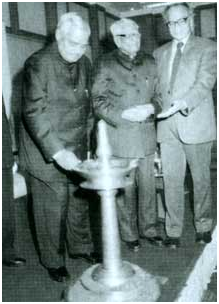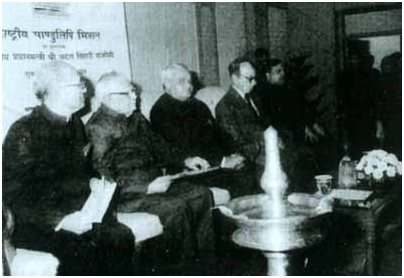The National Mission for Manuscripts was established in February 2003, by the Ministry of Tourism and Culture, Government of India. A unique project in its programme and mandate, the Mission seeks to unearth and preserve the vast manuscript wealth of India. India possesses an estimate of ten million manuscripts, probably the largest collection in the world. These cover a variety of themes, textures and aesthetics, scripts, languages, calligraphies, illuminations and illustrations.
The Mission has the mandate of identifying, documenting, conserving and making accessible the manuscript heritage of India. We see a national effort in the form of a mission for manuscripts as a logical, radical and urgent response to a very contemporary challenge- of reclaiming the inheritance contained in manuscripts, often in a poor state of preservation.
National Mission for Manuscripts is a National level comprehensive initiative which caters to the need of conserving manuscripts and disseminating knowledge contained therein. NMM is working towards fulfilling its motto, ‘conserving the past for the future’. It has emerged as a movement, undoubtedly the most popular and effective among all the heritage conservation initiatives in the country.
|

|
|
Launching the Mission, the Prime Minister Shri Atal Bihari Vajpayee said, "the NMM is different from the other missions undertaken till now. In this the benefits are neither direct nor visible....I believe that the NMM will bring to light many more Mohenjodaros and Dwarakas. Referring to the technological aspect of the Mission, the Prime Minister noted that modern science asks proof for claims and this very science (modern technology) is providing tools for resurrecting these proofs of our glorious past. Shri Vajpayee highlighted three aspects of the mission: since 70 per cent of the manuscripts are in Sanskrit, the teaching and learning of the language will have to be further promoted, several institution that are already working in the field will have to be associated with the Mission and finally, a huge awareness campaign has to be undertaken to encourage individual custodians of manuscripts to come forward and give them to the Mission. The Mission was announced by the Prime Minister in his August 15 speech from the ramparts of the Red For last year. The Department of Culture is the implementing Ministry and Indira Gandhi National Centre for the Arts has been declared the nodal agency for the Mssion. Former President Shri R. Venkataraman, Trustee of the IGNCA Trust said, of all the ancient civilizations, the Indian civilization alone is live. India has a huge wealth of knowledge on all subjects in these manuscripts as yet undiscovered. He emphasized on the need to approach individuals as a vast number of muscripts are lying in personal custody. He cited the valorous attempts by U. Ve. Swaminatha Iyer in collecting and publishing Tamil manuscripts. He said that it was then discovered that people had tied them in gunny bags and stored them in lofts. These will have to acquired, he said.  Prime Minister Shri A.B. Vajpeyee, Culture Minister Shri Jagmohan and Culture Secretary Shri Dhanendra Kumar |
|
Dr. L.M. Singhvi, President, IGNCA Trust, hailed the "will" of thePrime Minister in launching the Mission, Describing the moment as historic, he said it had not come a moment too soon. "Much has been lost and more is in danger of being lost," he added. The neglect of our manuscripts had been going on for long, even before the British came to India, Dr. Singhvi said. He pointed out that foreign travelers who came to India did not take away precious gems and gold but carried back manuscripts. Union Minister for Cultural and Tourism, Shri Jagmohan in his welcome address said the manuscripts that have come to light, and archaeological evidences such as the Rock Art that has been unearthed have changed the perspective about India. The task of the Mission is complicated he said and added that it was a challenge to the young scholars. He also mentioned that manuscripts that have gone out of the country would also have to be recovered. Secretary Culture, Shri Dhanendra Kumar presented the Vote of Thanks. |
| The Mission Document released on the occasion by the Prime Minister, along with a CD on the Mission details various aspects of the Mission. It says: "The voluminous nature of this task can be judged form the fact that at the present pace, it may take another five years to complete the new Catalogue Catalogorum and this itself may still not be a comprehensive listing, since a large number of collections (of manuscripts) with temples, mutts and individuals are still not listed or indexed." |



